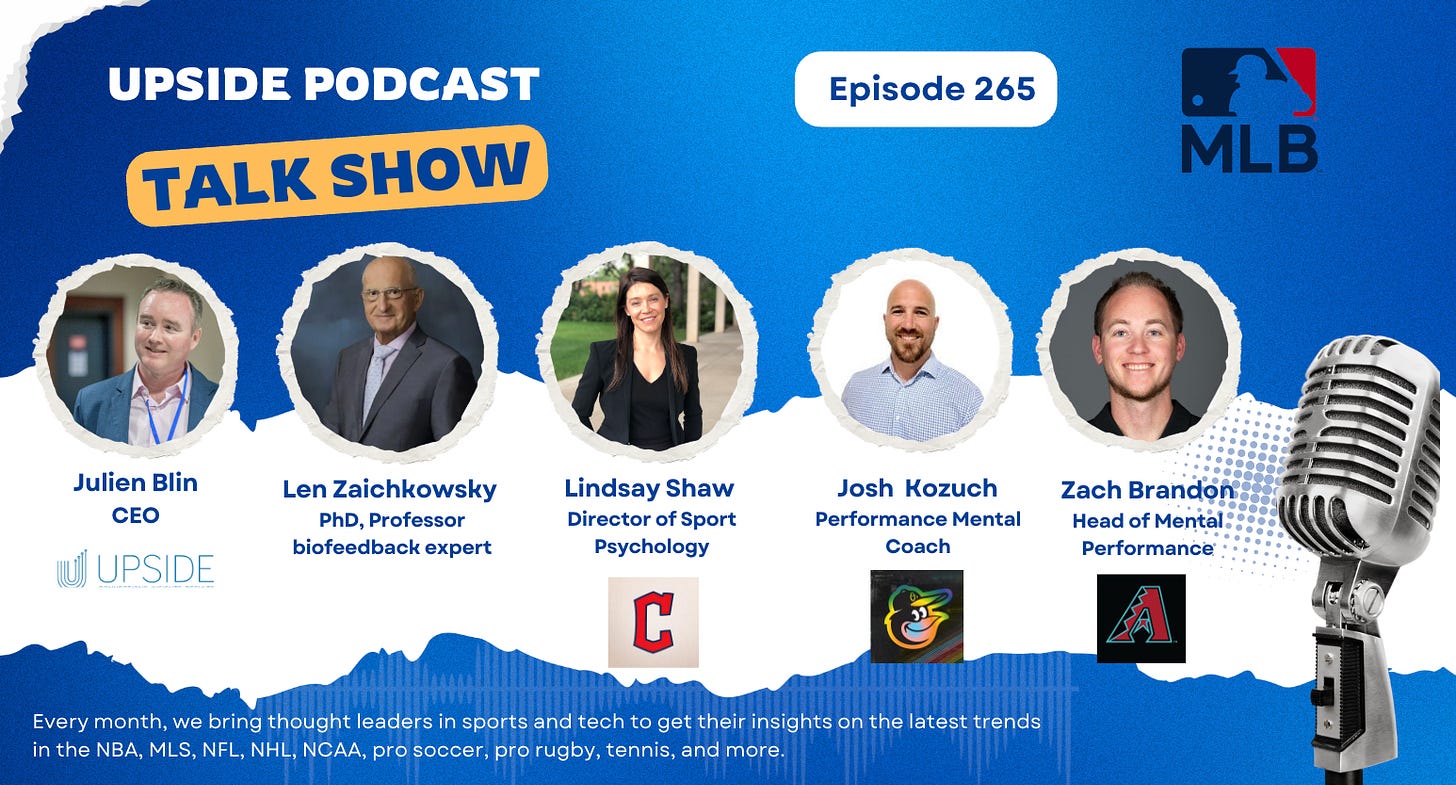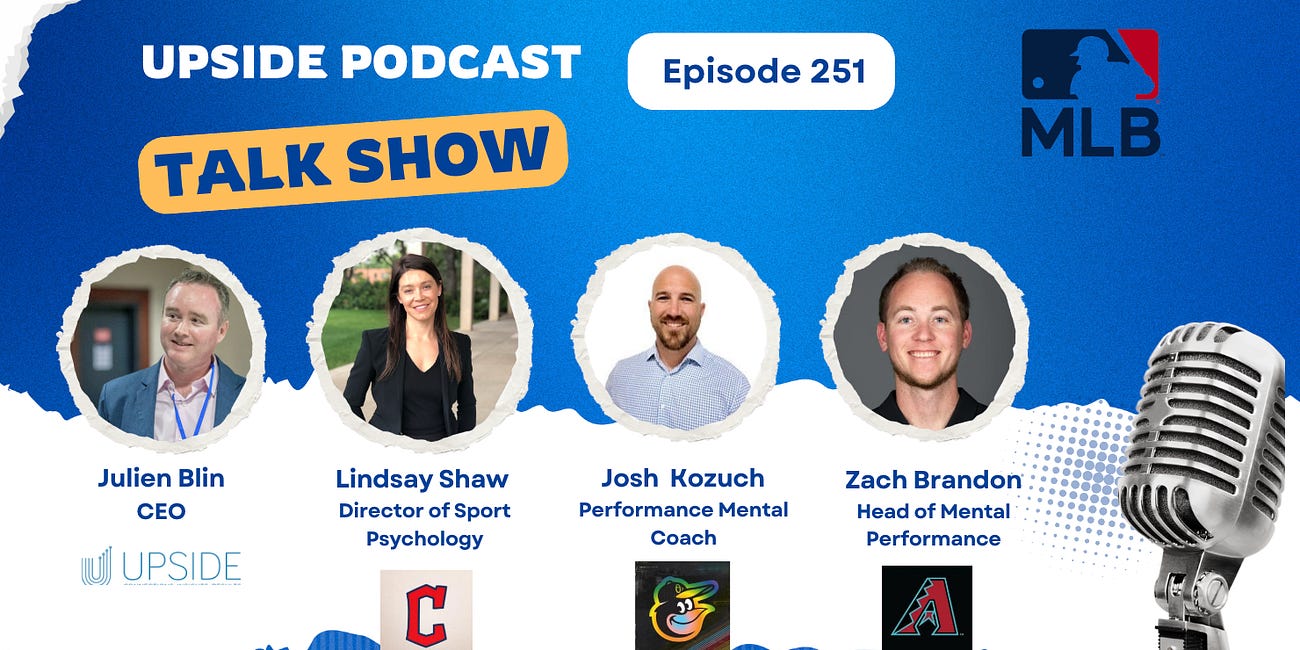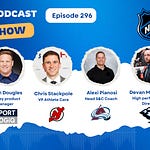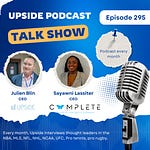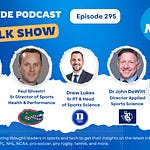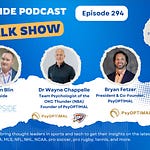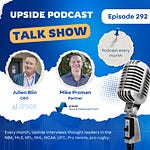Today we have the honor of interviewing a group of MLB practitioners that are experts in mental performance and preparation.
Lindsay Shaw, Director of Sport psychology for the Guardians, an MLB team.
Zach Brandon, Head of Mental Performance and Coach Development, for the Arizona Diamondbacks, an MLB team.
Len Zaichkowsky, PhD, retired Professor from the Boston University, World-class’ sports biofeedback expert.
Josh Kozuch, Mental Performance Coach for the Baltimore Orioles, an MLB team.
You can watch the video interview below by clicking on the Youtube link. You can also listen to the audio interview by clicking on the link at the top of the page:
In this interview we discussed the following topics:
Misconceptions & rewarding aspects of the job as mental coach.
Leveraging failure as a growth tool in the MLB.
The minor league gauntlet
The pressure and MLB culture
The stigma around mental health
You can also read the full transcript of the podcast interview with Lindsay, Zach, Len, and Josh located at the top of this blog post.
Here are the quotes from the interview with Lindsay, Josh, Len and Zach:
Q1 – Misconceptions & Rewarding Aspects of the Job
Lindsay Shaw
“When I first started, I was understandably intimidated. Working at the Olympic Committee, surrounded by some of the best athletes in the world, I thought, ‘What do I know?’ I was a Division I athlete, but this felt like a whole different universe. Over time, though, I realized I did have expertise—deep, meaningful experience in psychology, supported by mentors like Len Zaichkowsky and years of applied practice. What changed for me wasn’t just confidence; it was the realization that these elite athletes often lack development in basic areas like relationships, identity outside sport, and emotional regulation. They’re hyper-specialized in their craft, but often underdeveloped in life skills. Helping them explore those parts of themselves—joining them on that journey—is a privilege I never take for granted. That’s the most consistently rewarding aspect of this job: building trust, helping people become more whole, not just better players.”
Josh Kozuch
“Coming out of grad school, I expected players to be closed off to mental performance. That belief came from my own playing experience—college baseball in an environment where mental skills were never talked about. I had this insecurity too: ‘I didn’t play pro ball—what right do I have to tell these guys anything?’ But I quickly learned that most of the resistance I imagined was just that—imagined. Once players saw who I was and how I approached the work, they opened up. And the most rewarding moments are the unexpected ones—when a guy texts you years later to say, ‘Hey, remember that conversation we had in 2021?’ Sometimes I don’t even remember the exchange, but they do. It meant something. That’s incredibly fulfilling.”
Zach Brandon
“One of the biggest shifts for me was the realization that I didn’t need to be the star of the show. Early on, I thought I had to deliver the insights myself—player by player, one-on-one. Over time, I saw that working through coaches could be just as powerful, sometimes even more so. Coaches are present every day. They live in the clubhouse, on the field, in the cages. They’re the ones reinforcing mindset every single moment. My role became more about empowering them—giving them the tools and confidence to have those conversations themselves. That’s how we amplify our impact. I use a basketball metaphor a lot: I don’t need to score all the points. I’m happy to be the one dishing assists so others can lead. But when the moment demands it—when it’s my time to take the shot—I’m ready. That shift in perspective changed everything.”
Len Zaichkowsky
“When I entered this field over 50 years ago, my biggest misconception was assuming elite athletes already knew how to train their minds. I expected them to be well-versed in mental skills. But they weren’t—and many still aren’t. For decades, physical preparation dominated. We’d measure VO2 max, power, speed—but cognitive development? That was ignored. It’s only in the last several years that I’ve seen a real pivot toward the cognitive domain. And I agree with what the others said—the best thing we can do now is teach the teachers. Working with coaches gives you exponential impact. They’ve got the experience, the credibility, and the presence. When they’re empowered to reinforce mental performance daily, that’s when culture truly shifts.”
Q2 – Leveraging Failure as a Growth Tool
Zach Brandon
“Failure is inevitable in baseball. What separates those who grow from it versus those who crumble often comes down to two things: expectations and explanations. Before the failure occurs, what are your expectations? Do you believe the path will be linear? That your hard work will always be rewarded? If so, you’re setting yourself up for disappointment. Then, after failure hits, how do you explain it to yourself? Do you view it as evidence that you’re broken, or as a temporary obstacle? I love Derek Jeter’s line—‘Failure should be a speed bump, not a roadblock.’ We use that metaphor with players. And when you unpack failure like that—before, during, and after—you help athletes reframe setbacks into learning. It’s not about avoiding failure. It’s about mastering the way you respond to it.”
Lindsay Shaw
“Failure in baseball comes in so many forms—bad at-bats, not getting called up, season-ending injuries. But athletes often internalize those moments as indictments on their character. They feel shame, they avoid the topic, and they spiral. Our job is to help them see the full story. Sometimes you did everything right and the batter still crushed your best pitch. That’s not failure—that’s reality. And the best performers? They accept that. They don’t dwell. They reset. Those who struggle are often high in neuroticism—they ruminate, they overthink, they lose trust in themselves. We help them interrupt that cycle and rewrite the narrative. It’s a skill. It can be taught. And it changes careers.”
Josh Kozuch
“We try to give players back their sense of control. Failure will happen. It’s built into the game. But you always have a choice in how you respond. You gave up a home run—what’s your next pitch? You didn’t get called up—what are you doing about it? I also make sure players don’t only hear from us when they’re struggling. If the mental coach only shows up during a slump, you become the grim reaper. Instead, we talk during the good times too. What’s working? What are you doing when you’re thriving? That way, when failure comes, you have reference points—and a relationship—that helps you bounce back.”
Len Zaichkowsky
“The long arc of baseball is built on failure. Some of the best players in the league were stuck in the minors for years. But we forget that. I try to bring in real examples—guys who had terrible starts, got written off, then figured it out. When you show players those stories, you normalize the struggle and help them stay the course.”
Q4 – The Minor League Gauntlet
Josh Kozuch
“What people don’t realize is that these guys aren’t just baseball players—they’re growing into adulthood under extreme stress. They’re figuring out relationships, some are starting families, and they’re doing it while living out of suitcases, earning modest wages, and facing constant performance pressure. Most don’t have role models for this journey. That’s why bringing in veteran players to talk with the younger guys is so valuable. When a minor leaguer hears a big leaguer say, ‘I struggled too,’ it reframes their experience. It tells them they’re not alone—and that they can get through it too.”
Len Zaichkowsky
“The best thing I tell guys moving from the minors to the majors is simple: it’s still baseball. Yes, the pitches are faster, the pressure is higher—but the fundamentals haven’t changed. Play it like you did when you were a kid. When you lose that sense of joy and freedom, that’s when you get tight. Keep it simple. Enjoy the game.”
Zach Brandon
“One of the unique challenges of the minor league journey is that it’s not just about baseball—it’s about building a life under constant uncertainty. These are young men navigating adult responsibilities—some are getting married, starting families, dealing with real life—while also chasing an incredibly difficult dream. And what makes it even harder is that most of them don’t come from a background where they’ve seen this path modeled. They may be the first in their families, or even in their communities, to go through this kind of professional pressure. That isolation can weigh heavily.
One strategy I’ve seen work well is having veteran big leaguers talk to minor league players—especially in spring training. It helps normalize the struggles and challenges of the journey. These veterans say, ‘Hey, I went through it too. Here’s what helped me get through those long bus rides, the roster cuts, the not-knowing.’ When younger players hear that from someone who’s made it, it gives them hope, perspective, and a stronger sense of belonging. That human connection—that reminder that you’re not alone—is incredibly powerful in sustaining mental health and resilience through the grind.”
Lindsay Shaw
“Zach’s point is spot on—these players are trying to grow into the best versions of themselves on the field while simultaneously figuring out who they are off it. And the structure of professional baseball doesn’t always make that easy.
From a psychological standpoint, this period can be incredibly destabilizing. You’ve got players who dominated in college or high school suddenly facing daily reminders that they’re not guaranteed anything. Add to that the nomadic lifestyle, the inconsistent feedback, and the constant evaluation, and you have a recipe for identity stress.
What I try to do is re-center them in the ‘why’—why they started playing, what brings them joy in the game, and who they want to become, not just as players but as people. And then I help them build habits and emotional skills to manage those inevitable ups and downs. It’s not just about surviving the minor leagues. It’s about growing through them. That mindset shift—from ‘How do I make it?’ to ‘How do I grow while I’m here?’—can be transformative.”
Q5 – Pressure and MLB Culture
Lindsay Shaw
“The same mindset that gets players to the top can also tear them apart. Many develop a harsh inner voice—hypercritical, demanding, intolerant of anything less than perfection. That may work in the short term, but over time it erodes joy, damages relationships, and leads to burnout. What’s tragic is that many don’t even realize it’s happening—they just think they’re doing what it takes. Our work is helping them develop a healthier inner relationship. You can be elite and kind to yourself. You can strive without self-destruction.”
Josh Kozuch
“Baseball has made progress. Organizations now have full mental performance departments—not just one person trying to cover everything. We’re seeing the system start to evolve. It’s not perfect, but there’s more support now than there was a decade ago. And that’s making a difference.”
Zach Brandon
“I’ll speak more to the baseball system itself, rather than individual psychology. I think professional baseball has made meaningful progress in the last several years—especially when it comes to recognizing that mental performance and mental health support need to be built into the infrastructure, not added on as afterthoughts.
In the past, a single mental coach might have been asked to cover an entire organization—that’s hundreds of players across multiple levels, spread across the country or even the world. That model was never sustainable. What we’re seeing now is that more and more teams are building out true departments—not just mental skills coaches, but licensed clinicians, player care coordinators, and performance psychologists working together.
There’s still plenty of work to be done, but this shift represents a real acknowledgment that elite performance and long-term well-being are not mutually exclusive. In fact, they support each other. I’m encouraged by what I’m seeing, especially from organizations that are truly investing in this space—not just with personnel, but with time, leadership buy-in, and cultural integration. I’m excited to see where that momentum takes us.”
Dr. Len Zaichkowsky
“I think Lindsay articulated it perfectly—there is often a psychological toll that comes with the pursuit of greatness. Across every sport I’ve worked in—from hockey to baseball to Olympic disciplines—the pattern is the same. Athletes become elite because they drive themselves relentlessly, but over time, that drive can morph into self-punishment, emotional isolation, or even burnout.
What we’re starting to understand better—and what I think baseball is beginning to acknowledge—is that resilience and sustainability come from working with the whole person, not just the performer. As I’ve said before, this shift from focusing solely on physical attributes to valuing cognitive and emotional training is long overdue. But it’s coming. And when it does, I think we’ll see not just better performance—but longer, healthier careers and more fulfilled people at the end of them.”
Q6 – Stigma Around Mental Health
Lindsay Shaw
“A decade ago, talking to a psychologist in baseball was taboo. Now, many players have already worked with mental health professionals before they even get drafted. It’s becoming normal. They’re not coming in because they’re broken—they’re coming in because they want to grow. That shift is huge. But stigma still exists in some corners. Some players say, ‘My family told me never to do this.’ So we meet them where they are. We normalize the conversation, make it part of performance. Because that’s what it is.”
Len Zaichkowsky
“The turning point was when elite athletes started speaking out—Michael Phelps, Naomi Osaka, Simone Biles. That gave permission for everyone else. When players see that the best in the world struggle too, it lowers the barrier. It makes it okay to talk about what they’re going through.”
Zach Brandon
“The most powerful thing we do is leverage internal advocates. There’s always one guy in the clubhouse who’s respected and open about mental work. If he talks, others listen. And sometimes, that one conversation changes everything. Culture shifts from the inside out.”
Josh Kozuch
“There’s been a really positive shift in the last few years—more and more players are coming into pro baseball having already worked with mental performance coaches or psychologists. So the stigma isn’t what it used to be, at least not across the board. But that doesn’t mean it’s gone entirely. There are still guys, especially veterans or players from more traditional baseball backgrounds, who carry that mindset that talking to someone means something is ‘wrong’ with you.
That’s why one of the best tools we have is internal advocacy. When someone respected in the clubhouse opens up about using mental tools, others pay attention. You can leverage those voices—whether it’s a veteran player, a coach, or even a younger guy who’s found success—to shift the narrative. It’s one thing for me to say, ‘This stuff works.’ It’s another when a teammate says, ‘Hey, this helped me bounce back after a slump.’
You also have to be intentional about when and how you show up. If you’re only ever talking to guys when they’re struggling, you become the person associated with failure. So I make sure to connect with players when they’re succeeding too. We talk about what’s going well, what mental habits are helping them thrive. That way, when adversity comes—and it always does—they already see you as part of their support system, not a crisis-only resource.
In the end, it’s about relationships. The more trust you build, the more open players become. That’s how we chip away at the stigma—one connection at a time.”
You may also like:
⚾ Upside MLB Group Video Chat with Lindsay Shaw (Guardians), Zach Brandon (Arizona Diamondbacks), Josh Kozuch (Baltimore Orioles) on Mental Performance
Today we have the honor of interviewing a group of MLB practitioners that are experts in mental performance and preparation.


